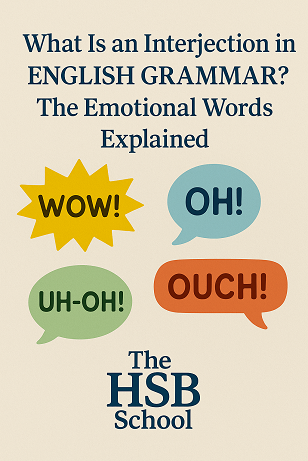Discover what is an interjection in English grammar: words that express sudden emotions like joy, surprise, or frustration. Learn types, examples, and usage rules in this lively guide!
Table of Contents

Introduction
“Wow! That’s amazing!”
“Ouch! That hurt!”
“Shh! Be quiet!”
These short, punchy words that pop up in our conversations are called interjections. They’re the spice of language—adding emotion, drama, and personality to our sentences.
But what is an interjection in English grammar exactly? Let’s break it down in a fun, easy way!
What Is an Interjection in English Grammar?
An interjection is a word or phrase that expresses sudden emotion, reaction, or sentiment. It’s not grammatically connected to the rest of the sentence—it just bursts in to convey feelings!
Examples:
- “Yay! We won the game!” (Happiness)
- “Oh no! I forgot my keys!” (Worry)
- “Phew! That was close.” (Relief)
Interjections are like emotional exclamation points in speech!
Types of Interjections
1. Joy & Excitement
Express happiness, celebration, or excitement.
- “Yippee! School’s out!”
- “Woohoo! I got the job!”
2. Surprise & Shock
React to unexpected moments.
- “Whoa! That’s incredible!”
- “Oh my God! Did you see that?”
3. Pain & Discomfort
Used when hurt or annoyed.
- “Ouch! That pinched!”
- “Ugh! This traffic is terrible.”
4. Greetings & Farewells
Casual ways to say hi/bye.
- “Hey! Long time no see!”
- “Bye! See you tomorrow!”
5. Doubt or Hesitation
Show uncertainty.
- “Hmm, I’m not sure.”
- “Well… maybe next time.”
6. Command or Attention
Used to order or alert someone.
- “Shh! The baby’s sleeping.”
- “Stop! Don’t touch that!”
Why Are Interjections Important?
- Add Emotion – Make conversations lively and expressive.
- Sound Natural – Native speakers use them all the time.
- Convey Tone – A simple “Oh!” can mean surprise, disappointment, or realization.
Common Mistakes with Interjections
❌ Overusing them in formal writing:
- “OMG! The results were astonishing!” (Too casual for an essay.)
- Better: “The results were astonishing!”
❌ Forgetting punctuation:
- “Wow that’s cool” → “Wow! That’s cool.”
❌ Mixing up meanings:
- “Oops! I’m so happy!” (Wrong – “Oops” is for mistakes!)
How to Use Interjections Correctly
- In Writing: Use sparingly in formal texts but freely in dialogues.
- “Alas! He was too late.” (Dramatic effect)
- In Speech: Emphasize with tone.
- “Ahem! Can I have your attention?”
- With Punctuation:
- Mild emotion: “Well, I tried.” (Comma)
- Strong emotion: “Help!“ (Exclamation mark)
Fun Examples in Pop Culture
- Movie: “Bingo!“ (When someone guesses right)
- Cartoons: “D’oh!“ (Homer Simpson’s famous line)
- Comics: “Pow! Bam!“ (Fight scene sounds)
Final Thoughts
Now you know what is an interjection in English grammar—those lively words that make chats more colorful! They might be small, but they pack a punch.
Try it out: Drop an interjection in your next conversation and see how it changes the tone!
Check out our post on Preposition
